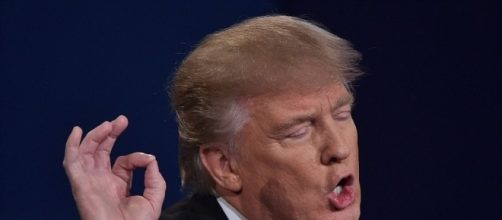President Trump has again U-turned on one of his key international policy pledges since coming into office. During the election campaign, Mr. Trump was critical of the One China policy, under which the US allows the Chinese to claim whatever it deems to be a breakaway province. However, following his telephone call with Chinese President Xi Jinping on Tuesday, it seems that the us president has accepted the policy and the continuation of the agreement between the two nations.
China applied significant pressure through diplomatic means by insisting that existing policies towards Taiwan remained in place, in return for continued trade cooperation between the two superpowers.
By stressing that the Taiwan issue was not on the table, the Chinese called President Trump's bluff; Trump backed down first.
Yet the first few weeks of the Trump administration have shown that this should not be a surprise to anyone. Despite his protestations and tweets expressing otherwise, Donald Trump's reputation has significantly deteriorated in the last few weeks, with many national leaders privately expressing their belief that the US President may talk big but is unable to actually back up his rhetoric with action.
Previous u-turns
This latest policy reversal has followed the trend of the previous few weeks within the White House. With regards to Israel, Trump's initial proclamations had led many to believe that the US would be softening their stance towards Israel's settlement expansion plans.
Israeli PM Benjamin Netanyahu, having been angered by the Obama administration's policies towards the issue, had felt that the incoming President would be an ally in expanding settlements in the region. On top of this, Trump's had also pledged to shift the US embassy in Israel from Tel-Aviv to Jerusalem. However, he has not followed through with either of these promises, in fact going further by telling the Israel Hayom newspaper that such actions would be 'not helpful' in the ongoing attempts to broker peace in the region.
President Trump has also softened his stance towards NATO, an organization that he had claimed was obsolete in the run-up to his inauguration. However, since coming into office, he has reiterated his administration's commitment to the alliance.
Last week, following a well documented and angry call with Australian PM Malcolm Turnbull, Trump had tweeted his anger at the previously agreed deal regarding refugee resettlements that had been negotiated by Barack Obama. Trump had described it as a 'bad deal' and promised to review it again, famously hanging up on the Australian PM in anger. However, as expected, the deal will be going ahead.
Losing his respect
It is clear that President Trump had little respect, both in the run-up to his inauguration and following his first month in the White House. World leaders have begun to realize that the President may act like bully but will back down when confronted. Even at home his decisions have been met with dismay and challenged, with the infamous 'Muslim Ban' having been rescinded twice by the courts.
Even the border wall with Mexico, should it ever be built, will know be paid for by the US taxpayer, with some estimating a cost of $25bn. With reports mentioning that the wall may be invisible in places, these plans are also unraveling
President Trump is beginning to understand that being President is not as easy as he may have expected it to be. On top of this, others within the administration are beginning to assert their dominance in key areas, making it more difficult for the President to act in the way he may prefer. Competitor nations have begun to view Trump as less of a threat than he may have proclaimed himself to be. One Iranian citizen told the Guardian that 'there are those who don't take Trump seriously. Some of them say he is not a real politician' and that 'Russia manipulates him and he will harm America more than anywhere else in the world'. It is difficult to disagree with such a belief.

